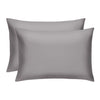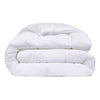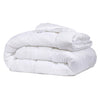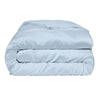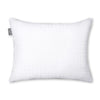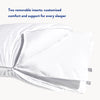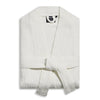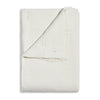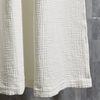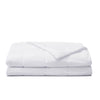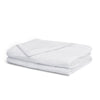
Slipping into a freshly made, perfectly tempered bed feels like no other, but that blissful state of mind can change pretty quickly once you realize your feet are cold. Freezing feet at night is an issue many people deal with, but there are many ways to warm up those bitter toes.
What Are the Most Common Causes of Cold Feet?
While a slightly low body temperature and cold feet usually aren't issues that should raise concern, that doesn't mean they aren't uncomfortable. Frostbite is relatively rare, but you don’t need to have frostbite to feel a deeply unpleasant chill.
Keeping your feet toasty all night can promote higher quality sleep and even help you fall asleep faster!
Let’s discuss some things that may be causing your cold feet, along with possible solutions.
Colder Weather
Of course, cold weather may cause cold hands and feet but let us explain why.
When cold temperatures arrive, the blood vessels in your feet and hands constrict, resulting in reduced blood flow to specific parts of your body. When blood flow decreases, your nervous system tells all your blood to go to more important areas, like your vital organs, leaving your extremities feeling a bit neglected.
However, we have tons of tips and tricks on bringing that much-needed warmth back into your soles (and soul).
Try a Temperature Regulating Comforter
Unless you plan to spend the latter half of the year vacationing in Fiji, your feet dilemma may worsen as the fall and winter seasons approach. However, even if you live in a colder climate, that doesn't mean you have to spend these months shivering under your covers.
Piling on blankets to warm your toes will only work for a little while. Eventually, you'll wake in the middle of the night hot and clammy and regretfully add “wash sweaty sheets” to your to-do list.
If that's the case for you, consider Miracle Made’s Temperature Regulating Comforter. This comforter will keep you comfy and cool all night while prioritizing the warmth of your feet. Plus, since it’s made with pure silver, it has antimicrobial properties, so you can do laundry a whole lot less than usual.
When in Doubt, Wear Fuzzy Wool Socks
Remember those fluffy socks that have been sitting in your top drawer since December? Well, it's time to whip them out; they're ready to make their big debut.
Fuzzy socks may feel like a strictly winter-time garment, but they should be the first thing you grab when your cold feet are causing you a restless night's rest. Fuzzy socks paired with a temperature-regulating comforter sound like a match made in heaven!
Stress or Anxiety
While inconvenient, cold feet are a less emotionally-dysregulating symptom of stress and anxiety, but they are a symptom nonetheless.
So, how can stress affect the temperature of your feet, anyways? When your body experiences increased stress, it releases a hormone called adrenaline. A sudden increase in adrenaline can send your body into a "fight or flight" response, causing your blood vessels to constrict to help preserve energy.
Stress or anxiety can directly affect your body's blood flow, which can cause your feet to feel much colder than usual.
Coping With Your Stress
Learning to cope with stress is no fun and not always the easiest task. Here are tips and tricks to cope with the stressors of work, your personal life, and everything in between.
1. Implement a Bedtime Routine
Implementing a bedtime routine may drastically improve your stress levels. It can be a hot bath or shower, putting on a face mask, lighting your favorite candle, or doing a quick PM stretch routine; whatever will make you feel relaxed and release dopamine.
You can also include steps in your bedtime routine to keep your feet warm, such as:
- Taking a relaxing warm-water foot bath
- Heating a hot water bottle to lay near your feet
- Applying heating pads to your feet
2. Unplug
Taking a break from your electronics may lower your stress or anxiety levels and promote an overall healthy lifestyle. Using electronics late at night can even be detrimental to your circadian rhythm (the body's natural sleep cycle).
Plus, it’s a great way to break out of a sedentary lifestyle and move more — making you more tired at night. Which leads up to the next tip…
3. Exercise Daily
Regular exercise can ensure our stress and anxiety levels are regulated. Even if it's just a 20-minute brisk walk, anything that keeps your body moving is worth it. Another excellent option is yoga, which promotes blood flow and circulation while centering our racing minds.
4. Get Enough Sleep
Getting enough sleep is vital to your physical and mental health. If you're struggling to get your total eight hours in, this may cause you to become stressed or anxious. Here at Miracle Made, we appreciate a good night's sleep and have a few tips on how to get more of them.
We think the perfect night's sleep starts with your bedding! If your sheets and blankets aren't up to par, you may find difficulty getting comfortable. High-quality, soft bedding such as 500-thread Count Supima cotton sheets could help you get the rest you need.
Getting the right amount of sleep takes a combination of things: a healthy diet, daily exercise, and much more, but having the softest bedding will surely help too!
Circulation Problems
Your body's blood supply and circulation are key components of your feet and hands' warmth and wellness. For many, circulation problems are the underlying cause of cold feet. Poor circulation issues can be completely minor or rather serious, so it's always important to consult your doctor if you begin to experience circulation issues.
Medical Conditions
In some cases, certain medical conditions may cause symptoms like cold feet and hands, including:
- Anemia: A low count of red blood cells that is often caused by a vitamin B12 or iron deficiency.
- Hypothyroidism: An underactive thyroid hormone.
- Raynaud’s Phenomenon: A condition in which cold temperatures affect blood circulation. (Also sometimes called Raynaud’s Syndrome or Raynaud’s Disease)
- Low Blood Sugar Levels: When your blood sugar is low, you may start to feel cold and fatigued as a result.
Other Ways to Treat Your Cold Feet
We've already given you a few ways to treat your cold feet. Here are more options to try when trying to treat your cold feet:
Massage
Massages are known for getting the warm blood pumping, and foot massages are no exception. Whether you get down and dirty with your own two hands or have your S/O get to work, foot massages are a great way to get some much-needed circulation back to your feet.
Plenty of H20
That's right, staying hydrated can help keep your feet warmer, resulting in a better night's sleep. Proper hydration is one of the easiest ways to ensure adequate blood flow and circulation.
Hydration is especially important if you're a very active person or are outside in the heat a lot. The average adult should consume no less than three liters of water daily.
Warm Feet? Yes Please!
Chilly toes are no fun and can put a damper on your sleep schedule. Luckily, when you have cold feet, there are tons of possible solutions you get to try. Toasty toes, here you come!
Sources:


